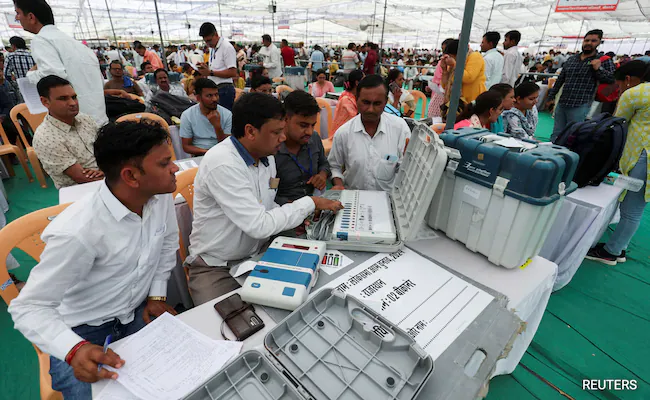Description

Copyright infringement not intended
Picture Courtesy: https://www.ndtv.com/india-news/ndtv-explains-form-17c-and-row-over-poll-panels-voter-turnout-data-5728033
Context: The Election Commission (EC) has stated that there is no legal requirement to share voter turnout data with anyone other than electoral candidates or their agents.
Details
- The Election Commission of India responded to the Supreme Court's query, highlighting that there's no legal obligation to disclose voter turnout data beyond candidates or agents.
Legal Mandate and Transparency Initiatives
- Statutory Framework: The Election Commission clarified that there is no legal requirement mandating the sharing of Form 17C, which contains the account of votes recorded, with anyone other than the candidate or their agent.
- Voluntary Transparency Measures: Despite the absence of a legal mandate, the Election Commission has taken voluntary initiatives to enhance transparency in the electoral process. These initiatives include the publication of voter turnout data through various channels such as a dedicated app, website, and press releases.
Provisional Nature of Data and Logistical Challenges
- Provisional Character of Data: The Election Commission emphasised that the voter turnout data provided through the voluntary initiatives is considered provisional and subject to verification. This highlights the inherent complexities involved in collecting and compiling data from diverse polling stations across the country.
- Logistical Constraints: The Election Commission cited logistical challenges, such as the transportation of Electronic Voting Machines (EVMs) and the accounts of votes recorded to the Returning Officer's base offices. These logistical constraints may contribute to delays in the publication of voter turnout data, as the Election Commission must ensure the secure and timely collection of electoral materials from remote and far-flung polling stations.
Allegations of Mala Fide Intentions and Judicial Endorsement
- Accusations of Malicious Intent: The Election Commission accused the Association for Democratic Reforms (ADR) of engaging in a "consistent mala fide campaign" aimed at casting doubts on the integrity of the electoral process.
- Judicial Validation of EVM System: The Election Commission highlighted a previous Supreme Court judgement that upheld the integrity of the Electronic Voting Machine (EVM) system.
Efficiency of Electoral Process and Conclusion:
- Smooth Conduct of Elections: The Election Commission asserted that the General Elections had proceeded smoothly thus far, despite the challenges posed by logistical constraints and public scrutiny. This efficiency and effectiveness of the electoral process highlights the Election Commission's commitment to conducting free, fair, and credible elections.
Overview of Form 17C
- Form 17C mandated by the Conduct of Election Rules, 1961, records detailed information about the votes cast at each polling station during elections. It includes data such as the number of registered voters, votes polled, votes rejected, and other relevant statistics.
- Voter turnout data is crucial for assessing participation levels in elections and ensuring transparency and accountability in the electoral process. It helps identify any discrepancies or irregularities in the voting process and serves as a basis for cross-verification during the counting of votes.
Controversy and Demands for Transparency
- Opposition leaders and political activists have raised concerns over the Election Commission's delayed release of voter turnout data, particularly for the first and second phases of the Lok Sabha elections.
- There have been allegations of significant differences between the preliminary voter turnout figures released on the day of polling and the final figures published later. This discrepancy has raised suspicions of potential fraud or manipulation in the electoral process.
- Opposition leaders have demanded that the Election Commission adhere to the statutory requirement of releasing Form 17C data within 48 hours of the close of polling. They argue that timely disclosure of this information is essential for ensuring transparency and preventing electoral malpractices.
- The Association for Democratic Reforms (ADR) filed a petition in the Supreme Court alleging an inordinate delay in releasing voter turnout data. The court ordered the Election Commission to respond to the petition and address the concerns raised by the ADR regarding the transparency and integrity of the electoral process.
- The Election Commission has asserted that there is no legal mandate requiring the release of Form 17C data to entities other than polling officials. It has been argued that indiscriminate disclosure of this data could lead to confusion and chaos during polling.
Conclusion
- The controversy surrounding Form 17C and the release of voter turnout data highlights the importance of transparency, accountability, and adherence to statutory requirements in electoral processes. While demands for timely disclosure of data aim to enhance public trust and confidence in the electoral system, the Election Commission must balance these demands with practical considerations and legal obligations to ensure the smooth conduct of elections and the integrity of democratic institutions.
Source:
THE HINDU
|
PRACTICE QUESTION
Q. What is Form 17C, often mentioned in news related to elections?
A) A document required for voter registration
B) An affidavit submitted by electoral candidates
C) A record of votes recorded at polling stations
D) A form for reporting campaign expenditure
Answer: C
|















